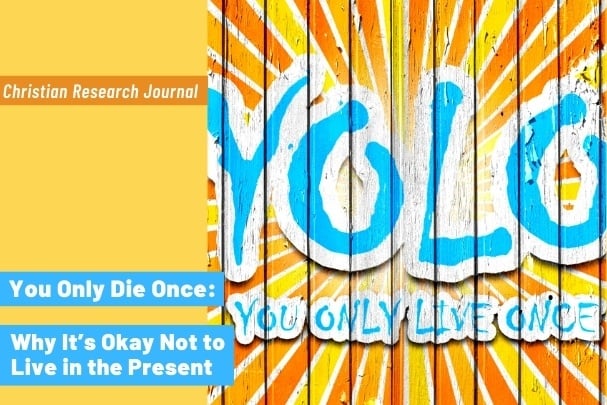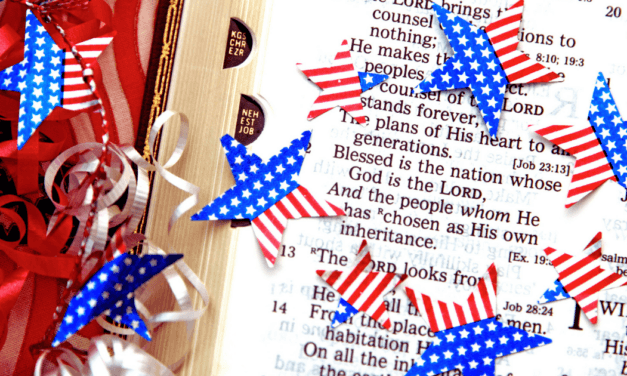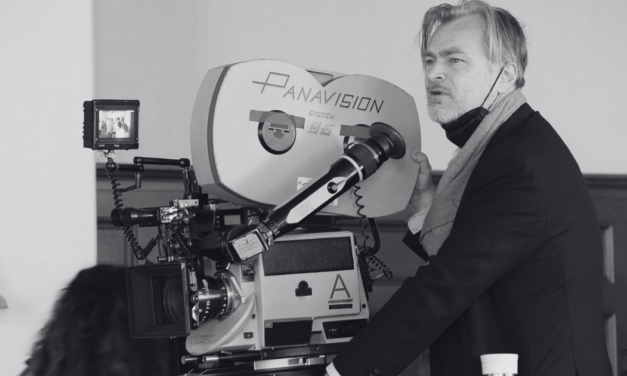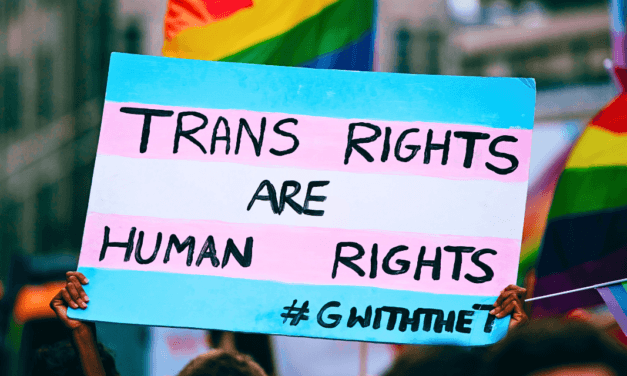This is an online-exclusive from the Christian Research Journal. For further information or to subscribe to the Christian Research Journal please click here.
When you to subscribe to the Journal, you join the team of print subscribers whose paid subscriptions help provide the resources at equip.org that minister to people worldwide. These resources include our ever growing database of over 1,500 articles, as well as our free Postmodern Realities podcast.
Another way you can support our online articles is by leaving us a tip. A tip is just a small amount, like $3, $5, or $10 which is the cost for some of a latte, lunch out, or coffee drink. To leave a tip, click here
“YOLO,” said my child, rolling his eyes, replacing his capacious headphones over his ears, and wandering out of my kitchen and into his own world. I called to him, desperately trying to make myself heard over whatever it was he was listening to. “Come back,” I cried, “What does that mean? YOLO?”
“It means you only die once,” he said, laughing.1 He is a great one for jokes, but I think, as the young so often do, he has shown the way. In a world where “you only live once” (YOLO) is the guiding maxim not only for blowing off steam on the weekend, but for how you prepare for retirement, what kind of job you are willing or unwilling to consider, and ultimately for how you arrange your mental, emotional, and spiritual furniture, I think his quip invites the Christian into a profound truth.
What Is YOLO?
When I asked my child what YOLO means, of course, I was being a little bit ridiculous. The term was added to the Oxford English Dictionary in 20162 but appears as early as 2011 when Drake, the Canadian singer and hip-hop artist, used it in a famous, excessively profane song, “The Motto.”3 A fresh iteration of the ironically timeless “carpe diem,” YOLO is as plastic as that term, molding itself to any single person’s perception of the good life. How I employ it reveals my heart priorities, the things I most value, and the dimly apprehended reality that what I believe about tomorrow will necessarily shape how I live today.
The term is so ubiquitous as a cultural trope that it appears in the most innocuous and bland discussions — the testy and impatient Dave Ramsey castigating those who don’t want to think ahead to the future,4 my favorite UNICEF funded Ghanaian YouTube soap-opera-esque sitcom encouraging young people to make good life choices,5 the sardonic 2013 pseudo-hip-hop effort of that name by pop singer Adam Levine and hip hop artist Kendrick Lamar,6 and advice about how to have fun in the stock market without ruining your life.7 But if you do a YouTube search, those are not the first results. Rather, a nauseous animated program replete with vulgarity, profanity, and sex comes right up. Perusing YOLO across multimedia illuminates a considerable generational gulf between those like Christian finance advisor Dave Ramsey who castigate the term, and the young whose embrace of it betrays a gloomy despair, as if there is nothing beyond this life or even this moment. In that chasm one may read the failure of our culture to speak about a powerful and loving God who cares not only about the future, but even about the present.
Must I Live in The Moment?
Against this cultural malaise are painted the deeper psycho-spiritual notions of what happens to the soul in death, and how to push against the wearying (false) expectations of post-life annihilation. Author Eckhart Tolle’s rise to prominence inside Oprah’s spiritual empire with the The Power of Now (Namaste, 1997) and A New Earth (Dutton, 2005) happened when the vestigial memory of the Christian hope of eternal life was fading fast in our cultural imagination. Mixing together the Buddhist idea of mindfulness — to keep your attention focused as closely as possible on what you are doing this second, usually by use of the breath — with New Age and Hindu practices, Tolle mainstreamed this age’s favorite religious assumptions.8
In this way of thinking, anxiety is associated with the future and depression with the past, so the moment you are in now is the only one that matters. Tolle describes how to achieve this attentive focus on the now while you stand at the sink washing your hands, or by walking across a room, or climbing the stairs. The moment you are in now is the only moment. There are no others.9
As John Martin Fischer astutely points out, this claim necessarily presents certain philosophical conundrums:
By the linguistic rules of usage, now helps to specify a proposition expressed by the statement in which it occurs, contributing a different time on different occasions of usage. So, whereas ‘It is now’ is always true, it does not follow, and it is not true, that the locution always expresses the same proposition. It’s thus not true that it’s always now, in the sense that it’s always the same time — the only time we have.
So the initial insight, rendered true by the semantic rules pertaining to the temporal indexical now, is too trivial to imply the substantive and important claim: the connection thesis [the contention that we should focus our full attention on the present moment precisely because of its singularity]. Interpreted so that it’s correct, the intuitive idea that it’s always now doesn’t support the crucial inference that we should focus on the present because of its singularity — because it’s all we have.10 (emphasis in original)
Apart from making the head spin, “now” as a philosophical concept is possible for us to consider only because we have all the other moments. Because we are able to step back and see what happened before, and what will happen later, we are not trapped in the singular and sometimes excruciating present. Indeed, I am writing this at one time, and you are reading it at another, and yet we are able to understand each other in time and space. It is too reductive to insist that I must only concentrate on the tapping of my fingers on the keyboard and not wonder to myself what you might be doing weeks from now when you scroll your finger across some other screen. And all this before we have even considered an eternal God who orders all moments — the one now, the one before, and the one coming up — for His own purposes.
Nevertheless, the idea of mindfulness has joined the broad river of Christian culture. One popular example of the genre is Shana Niequist’s Present Over Perfect (Zondervan, 2016), the story of how she was so anxious and busy but learned that if she concentrated on where she was in each moment, she could heal herself of her over-pressed lifestyle. A sort of updated, less theological reflective option than Brother Lawrence’s The Practice of the Presence of God (17th century), Niequist’s version has metastasized all over mainstream evangelicalism. Sin is no longer an active offense against a holy God by thought, word, and deed. Rather, the greatest problem — especially for middle class American women — is to be too busy to enjoy your life, of trying to be “perfect,” though not in the way Jesus means in Matthew 5:48, rather than “present.” Awareness of your own feelings and needs is the highest good, the mincing trend towards the gospel of self-actualization.
In service of this ideal comes a proliferation of apps, time-management bullet journals, and other kinds of systems to keep you centered on where you are at every instant. Habit trackers remind you to drink water, exercise, and read improving books. Mind maps help you dump the contents of your spirit onto a flat page so you can see what your dreams really are and how to actualize them. For the young, the darker turn of the app YOLO, an offshoot of Snap Chat, lets you ask anonymous questions of your acquaintances and ultimately bully those you despise.
What Does Death Mean for Life?
For all the confusion of trite consumerism masquerading as mindfulness, the sheer popularity of this way of thinking points to the Christian truth that how you live does matter. In 2000, John Piper preached a sermon that launched a generation that would dedicate their lives to the gospel.11 From thence came a book called Don’t Waste Your Life (Crossway, 2003) in which he called Christians to count the cost and follow Jesus. You have only one shot — don’t waste it. A uniquely Christian spin on the secular cry of YOLO or carpe diem, Piper clarified the pressing demands of the gospel itself. “Take up your cross,” says Jesus, “and follow me, for whoever will lose his life for my sake will find it” (Matthew 16:24–25 ESV).
Death has a singularly clarifying quality. As the philosopher behind the television series The Good Place (NBC, 2016–2020) points out, if you don’t die, nothing matters. Because you do die, you can choose the way you will live.12 You can seize certain aspects of life and make them count. God certainly agrees. You have only one life, so what are you going to do with it? Are you going to lick the doorknobs during a pandemic because you’re going to die anyway and you want to go out with a coughing fit? Are you going to spend all your money as quickly as you can? Are you going to save for posterity? Perhaps you will live in the shadow of fear about the death that certainly awaits you. You will choose never to go anywhere, especially in a time of pandemic, and have everything delivered to your door. All these possibilities are fully on display in our current moment, and some of us have gone back and forth between them, trying to figure out how to live before we have to die.
The deeper and more alarming truth, however, is not that you only live once. You actually live twice, the second time forever. It’s the death that happens once — and how you approach it is the critical factor for how you live not only for evermore, but for now.
Spend Yourself
In his article, “Don’t Live in the Moment: That’s Spiritual Malformation,” Clay Jones points out how cruel it is to call people to live exclusively in the present:
If all is going well, then living in the moment isn’t that hard. You might even be able to block out the suffering of those close to you and put out of your mind that your daughter just died of cancer (that’s in the past, after all). But if your pain now, presently, is severe, then “live in the moment” leaves a lot to be desired. If you are, presently, lying in a hospital, intubated, catheterized, suffering nine-level-pain on that zero-to-ten pain-scale, while dying from cancer, then that is the present moment. Do you want to be mindful of the catheter? IV? Feeding tube? After all, if those things are happening now, that is a pain-filled moment. You might choose to live in the present, and push out of your mind that — present, active, indicative — you are dying in pain, but living in that moment is experiencing the tubes and the pain. Are we supposed to shut out that part of the present? Indeed, a study of randomized controlled trials only “found low-quality evidence that mindfulness meditation is associated with a small decrease in pain.” So this “low-quality evidence” tells us that if your pain is level nine, then living in the present might make it level eight?13
This is particularly true, I think, in the time of a pandemic, where I am able to remind myself that this won’t last forever, which helps me cope in the present. The other help, though, and the greatest antidote to the burden of “mindfulness,” of thinking that you have to really live every moment where you are to its fullest, is my favorite hymn which ends with Geoffrey Anketell Studdert-Kennedy’s beautiful poem, “Awake, Awake to Love and Work” (1921). The last verse says:
To give and give, and give again,
what God hath given thee;
to spend thyself nor count the cost;
to serve right gloriously,
the God who gave all worlds that are,
and all that are to be.14
I have found myself always called upon by God, and by the crying of children and church and ordinary life, “to give and give, and give again” what God has given me. Each day is crowded with beauty and trouble. Keeping my attention fixed on what is right in front of me is sometimes a beautiful proposition, a sky ablaze at twilight, or the soft sweat of a sleeping baby. Many other times, however, it is a horror, as most of the world outside the wealth and privilege of North America already know. No matter your circumstances, whoever you are, when you fix your eyes on Christ, He enters into your current sorrows, and pulls you forward into His perfect and everlasting joy (Hebrews 12:1–3). His command is not be mindful, but to love Him (Romans 13:8), no matter how your attention wanders, your hands grow weary, your feet stumble, or your heart sins (Hebrews 4:14–16). After all, you only really die once. Better to die now in the small things, to the small-minded troubles of Now, and live in God’s glorious and bright forever (2 Corinthians 4:7–18). This is but the shadowy threshold of eternity. What’s a little bit of suffering on the way to behold, as Studdert-Kennedy says, “The Great Lord of Years and Days”?
Anne Kennedy, MDiv, is the author of Nailed It: 365 Devotions for Angry and Worn-Out People (SquareHalo Books, revised 2020). She blogs about current events and theological trends at Preventing Grace on Patheos.com.
NOTES
- I am sure this phrase originates in some great work of literature, but no one can seem to remember which one.
- Beatrice Verhoeven, “’Yolo’ Is Now a Word in the Oxford English Dictionary,” The Wrap, September 12, 2016, https://www.thewrap.com/yolo-biatch-oxford-english-dictionary/.
- Simon Dagher lists some of Drake’s lasting innovations in Shifter Magazine: “How Drake Became the Most Dominant Force in Hip-Hop,” n.d., https://shiftermagazine.com/music/drake-most-creative-force-hiphop.
- The Ramsey Show, “Don’t YOLO Your Life Away,” December 26, 2020, https://youtu.be/UGLPXio0UVA.
- YOLO, Farmhouse Productions, November 2, 2017, https://youtu.be/qRhNizUzbdk.
- Adam Levine and Kendrick Lamar, “YOLO,” January 27, 2013, https://youtu.be/z5Otla5157c.
- Jamal Carnette, “3 ‘YOLO Stocks’ to Buy Now,” The Motley Fool, January 27, 2021, https://www.fool.com/investing/2020/12/17/3-yolo-stocks-to-buy-now/.
- See Warren Nozaki’s excellent review in the Christian Research Journal for a fuller view of Tolle’s theological claims: “Paradise Still Lost in Eckhart Tolle’s ‘A New Earth,’” Christian Research Journal, vol. 31, no. 5 (2008), Christian Research Institute, January 19, 2011, https://www.equip.org/article/paradise-still-lost-in-eckhart-tolles-a-new-earth/.
- “Two Exercises to Help you Stay in the Present,” A New Earth—Oprah Winfrey Network, March 23, 2014, https://youtu.be/_bDSN7d1Z4c.
- John Martin Fischer, “The Problem of Now: The Injunction to Immerse Yourself in the Present Might Be Psychologically Potent, but Is It Metaphysically Meaningful?,” Aeon, January 8, 2021, https://aeon.co/essays/the-metaphysical-claims-behind-the-injunction-to-be-in-the-now?utm_source=morning_brew.
- Sarah Eekhoff Zylstra, “How John Piper’s Seashells Swept Over a Generation,” The Gospel Coalition, March 20, 2017, https://www.thegospelcoalition.org/article/how-john-pipers-seashells-swept-over-a-generation/.
- Lizzy Francis, “The Philosopher Behind ‘The Good Place’ Explains How to Raise Good Kids,” January 18, 2019, https://www.fatherly.com/play/the-good-place-todd-may-philosophy/.
- Clay Jones, “Don’t Live in the Moment: It’s Spiritual Malformation,” November 29, 2020, https://clayjones.net/2020/11/dont-live-in-the-moment-its-spiritual-malformation/.
- Geoffrey Anketell Studdert-Kennedy, “Awake, Awake to Love and Work,” 1921, https://hymnary.org/text/awake_awake_to_love_and_work.









